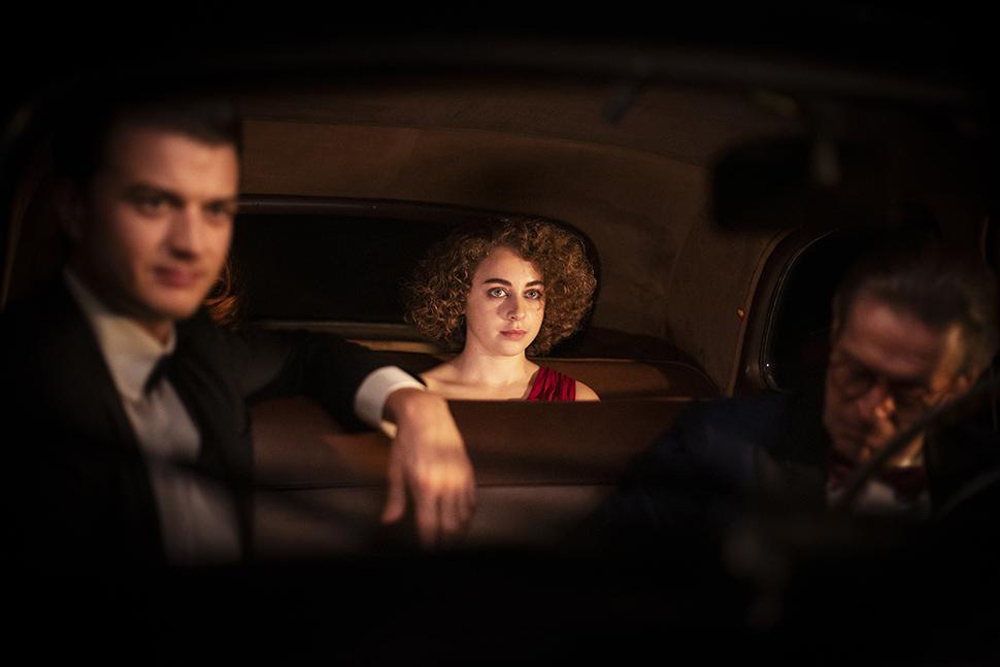The first hint of modernity in “Finally Dawn,” at least to these eyes and ears, arrives ironically when Mimosa (Rebecca Antonaci) first walks onto the set of a period piece, “Merneith the Pharaoh Woman,” a swords-and-sandals epic set in ancient Egypt and filmed in the 1950s and instead of stepping back into the past, it feels as if she’s reached the future. She isn’t in the frame, but the film-within-a-film’s star Josephine Esperanto (Lily James) insists she stand next to the camera in her line of sight after spotting her in the hallway of the production offices at Cinecitta, and once “action” is called, “Finally Dawn” snaps into envisioning the finished version of the scene in which Esperanto gives a commanding address to her subjects, with a score breaking away from the classical orchestral swells that have accompanied Mimosa along her way to the production stage into propulsive synth sounds and the crispness of the image surely digital and not the rosy celluloid (or at least incredible facsimile) that has come before in the “real world.”
It’s quite subtle in intent, if not execution when the scene itself is meant to jar Mimosa, seeing how a set really operates after spending so many afternoons of escapism in movie palaces with her mother Elvira (Carmen Pommel) and her sister Iris (Anna Manuelli), but the effect is eerily the same even for the most jaded viewer when Saverio Costanzo’s latest feature arrives at a time when it feels like the movies may have lost a little bit of their magic for all kinds of reasons. “Finally Dawn” opens with Elvira and Iris complaining about having to sit through a black-and-white World War II drama with a particularly bleak ending and it’s not difficult to hear Elvira’s specific lament about having “World War II thrown back in our face” when all she wants is entertainment and apply it to the desire to see something more uplifting in the times we live in, no matter what one’s circumstances are.
The fact Mimosa still finds value in the film in spite of her mother and sister’s feelings about it should be a hint she’ll take center stage, but Costanzo leads you to believe at first that it’s really going to be Iris’ time to shine after the family is approached leaving the theater, looking for extras for “Merneith” and believes he’s found someone as beautiful as the star of the film they just saw. Mimosa tags along with Iris on her trip to the studio, her future seemingly set already when she’s committed to a fiancé, but after both are dismissed by an assistant director, she is called back to set unaware that when she saw Josephine walking past, the actress was looking back at her. Yet if this is the point where one thinks this is the start of “A Star is Born,” Constanzo has something far more interesting in mind when there is less interest in seeing a career take shape than how a single night does after Josephine offers Mimosa the chance to blow off some steam after leaving the set, requiring more of a performance than any time the camera was rolling.
“Finally Dawn” plays out like an ongoing nude scene for Josephine – firmly in control of a closed set where all eyes are on her, but nonetheless the most vulnerable for the same reasons that give her such power, and Costanzo is particularly compassionate towards the plight of actresses, said to have been inspired to make the film by the mysterious death of Wilma Montesi, an aspiring thespian who washed up one day on shore looking like she was chewed up and spit out by an industry that cared not for her. Montesi’s death comes up now and again throughout the evening in which Mimosa is privy to a hundred tiny ones, caught off-guard that Josephine can barely conceal her boredom in situations she finds exhilarating and seeing how little agency there is for women even at the top of their profession.
These may not be new observations, but they feel fresh in how “Finally Dawn” presents them, with reminders of how easily one can get lost in movies even from the few minutes spent in Mimosa’s humble home where the sumptuous combination of Laura Pozzaglio’s production design, “Call Me By Your Name” DP Sayombhu Mukdeeprom’s cinematography Antonella Cannarozzi’s finely tailored costumes lifts the ordinary into the extraordinary while making one simultaneously aware of everything that goes into creating that image, which isn’t always pretty. Still, for an illusion, “Finally Dawn” really captures something, having that ineffable, impressive quality that keeps one coming back to the movies.
“Finally Dawn” will screen again at the Venice Film Festival on September 1st at 10:20 pm at the PalaBiennale.




